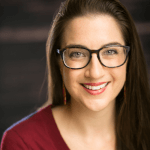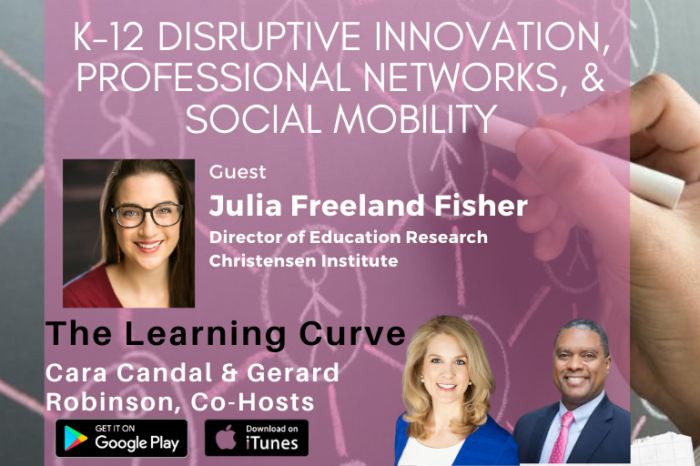Christensen Institute’s Julia Freeland Fisher on K-12 Disruptive Innovation, Professional Networks, & Social Mobility
This week on “The Learning Curve,” Cara and Gerard are joined by Julia Freeland Fisher, director of education research at the Clayton Christensen Institute. Julia shares how her liberal arts and law school background has informed her career path and views on education reform, and how her work with the late Professor Christensen and Michael Horn on disruptive innovation and education technology have provided fresh insights. Julia discusses the promise and scalability of online learning even prior to COVID-19, and shares her views on the power of professional networks, relationships, and technology for closing what she views as the “social gap,” which is also the topic of her book, Who You Know: Unlocking Innovations That Expand Students’ Networks. Lastly, she offers analysis on digital learning models across the country that are addressing this gap and advancing social mobility.
Stories of the Week: With his party’s anti-charter school platform proposals, is Democratic presidential nominee Joe Biden sacrificing the best interests of America’s underprivileged schoolchildren? The EducationNext annual survey results show an interesting linkage between populism and views on education policy; and that an increasing percentage of parents are open to enrolling their child in some online high school courses.
Interview Guest:
 Julia Freeland Fisher is the director of education research at the Clayton Christensen Institute. She leads a team that educates policymakers and community leaders on the power of disruptive innovation in the K-12 and higher education spheres through its research. Julia is the author of Who You Know: Unlocking Innovations That Expand Students’ Networks (Wiley, 2018). She has published and spoken extensively on trends in the EdTech market, blended learning, competency-based education, and the future of schools. Julia’s white papers and writing on disruptive innovations have appeared in many national media outlets, including Education Next, Forbes, entrepreneur.com, The Chicago Sun-Times, and CNN. Prior to joining the Institute, she worked at NewSchools Venture Fund and has also served as an instructor in the Yale College Seminar Program. Julia holds a bachelor’s degree from Princeton University and a J.D. from Yale Law School. Julie tweets at: @juliaffreeland.
Julia Freeland Fisher is the director of education research at the Clayton Christensen Institute. She leads a team that educates policymakers and community leaders on the power of disruptive innovation in the K-12 and higher education spheres through its research. Julia is the author of Who You Know: Unlocking Innovations That Expand Students’ Networks (Wiley, 2018). She has published and spoken extensively on trends in the EdTech market, blended learning, competency-based education, and the future of schools. Julia’s white papers and writing on disruptive innovations have appeared in many national media outlets, including Education Next, Forbes, entrepreneur.com, The Chicago Sun-Times, and CNN. Prior to joining the Institute, she worked at NewSchools Venture Fund and has also served as an instructor in the Yale College Seminar Program. Julia holds a bachelor’s degree from Princeton University and a J.D. from Yale Law School. Julie tweets at: @juliaffreeland.
Tweet of the Week:
Tuesday marks the 100th anniversary of the 19th Amendment. When the words “the right of citizens of the United States to vote shall not be denied or abridged … on account of sex” were added to the U.S. Constitution. https://t.co/yS0vltuLjI
— NBC News (@NBCNews) August 17, 2020
The next episode will air on August 28th, 2020 with Devery Anderson, the author of Emmett Till: The Murder That Shocked the World and Propelled the Civil Rights Movement.
News links:
WaPo op-ed: Why Joe Biden shouldn’t give up on public charter schools or standardized testing
Ed Next poll: “Amid Pandemic, Support Soars for Online Learning, Parent Poll Shows”
Get Updates on Our Education Research
Related Posts















